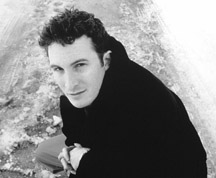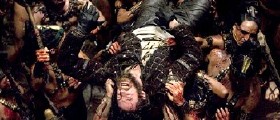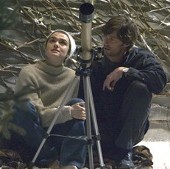 This summer Nick got a chance to talk with Darren Aronofsky at the San Diego Comic Con. I was jealous, truth be told, since Aronofsky is one of my favorite modern filmmakers. With just two movies under his belt – the brilliant Pi and the masterpiece Requiem for a Dream – Aronofsky has set himself among the ranks of the truly original visionaries. The real test is going to be his third film, though, the science fiction epic romance The Fountain, which has been on its way to movie screens for years. It first began as a Brad Pitt movie; when the funding dried up all looked lost. But Aronofsky stuck with it and managed to bring the project back from the dead – The Fountain has finished shooting, and the director is now working on post-production.
This summer Nick got a chance to talk with Darren Aronofsky at the San Diego Comic Con. I was jealous, truth be told, since Aronofsky is one of my favorite modern filmmakers. With just two movies under his belt – the brilliant Pi and the masterpiece Requiem for a Dream – Aronofsky has set himself among the ranks of the truly original visionaries. The real test is going to be his third film, though, the science fiction epic romance The Fountain, which has been on its way to movie screens for years. It first began as a Brad Pitt movie; when the funding dried up all looked lost. But Aronofsky stuck with it and managed to bring the project back from the dead – The Fountain has finished shooting, and the director is now working on post-production.
That was where I found him. Or rather, where he found me. After a couple of weeks of trying to get schedules aligned, I finally got a phone call from Aronofsky. He didn’t have a lot of time to talk, and he was knee deep in work, but he was incredibly gracious about taking twenty minutes out of his day to keep CHUD.com’s readers up to date on his film.
Aronofsky: I was just looking over some shots. They had to pull me out. What did you think of the teaser?
Q: I loved it. And I have to tell you that the reaction to the teaser on our site has been so positive it’s almost frightening.
Aronofsky: Oh, good!
Q: One of our readers said it was like someone is finally using film to its full potential.
Aronofsky: That’s pretty sweet.
Q: So this is looking like your most mainstream thing to date. Is it fair to say that?
Aronofsky: [laughs] Yeah, I think so. I don’t know, everything you hope is mainstream, but then when you realize that you’re making a black and white film about math and God that maybe you’re the only person that thinks it’s mainstream. But then again, when I did make Pi I thought it was for a very small audience, but I’m always surprised that I’ll go off to Europe or Japan and people are really enjoying the film. Audiences really enjoy seeing things that are different. I think there’s all this panic going on about box office and everything and I just hope that it’s pointing people at the studios into making films that are new experiences and a bit different. I’ve been complaining that for the last few summers there’s been great ideas and great hype on films, and then when you go to the movie theater it’s really rare that you actually see something where you feel really fulfilled.
Q: It seems like the best work is being done in marketing.
Aronofsky: [laughs] Exactly! They always seem to have these great ideas and you’re always excited, because the concepts are great but the executions don’t always fulfill the expectations. But then King Kong is coming and you know that’s going to fulfill all expectations and go past all of them – or so we hope.
But they’re far and few between. I’m one of those people who likes video games and watching movies at home, but everyone still enjoys going to a movie theater and getting lost  and having a total experience. That’s sort of my goal, always, to try and make something that is experiential, something that you want to see with a crowd of people on a big, big, big screen.
and having a total experience. That’s sort of my goal, always, to try and make something that is experiential, something that you want to see with a crowd of people on a big, big, big screen.
Q: And The Fountain is that kind of a film.
Aronofsky: I hope so! That’s what we’re going for. We’re trying to make it big with the limited resources we have. Everything is on the screen. We’ve all been struggling all these years because we all believe in it. I think if you work on something hard enough and long enough, no matter how it turns out, people will appreciate all the labor and pain that went into it.
Q: And a lot of pain went into this.
Aronofsky: Oh yeah. It’s been a long road.
Q: Do you know yet when this road is going to end?
Aronofsky: For us we’re going to probably finish up the film end of February, early March. Then it becomes the big boys and big girls’ decision on when to release it. They want to take their time and see it before they decide when to release it.
Q: What do you still have left to do that’s going to take you through til February?
Aronofsky: We’ve got a bunch of visual effects to finish up, which should get done in a month or two. And then we have to do normal things, like mixing and scoring, and that takes a bit. We picture locked a couple of weeks ago and once you picture lock it’s still two or three months until everything is done. My composer is actually in the next room blasting, you might be able to hear some stuff.
Q: Who’s composing?
Aronofsky: Clint Mansell. Everyone is in the same building now, on the same floor. The editing room is on one side, and then the other side VFX, and the producers and the sound department and the music department. It’s fun because we’re all here together.
Q: Was it surreal to hear Clint’s Requiem music in the trailer for The Two Towers, and in so many other trailer since?
Aronofsky: I have to admit, I was a little upset at first. That’s such a big movie with endless resources, but you know I think – Clint’s just walking by. [to Clint] I’m doing an interview for online. They asked how it felt when Two Towers used the Requiem score.
Clint Mansell: The bank account felt great!
Aronofsky: Unfortunately, my bank account didn’t feel shit! You owe me a beer, Clint.
But it was cool, and it was very flattering. Clint deals with that a lot because Clint writes music that – I remember being down in Argentina, and the tube down there, the train down there, was using the Pi music. It was the most bizarre thing in the world. You’re standing on the train and instead of Muzak, they’re pumping in Pi.
That’s always exciting because you’re hiring people that are doing good work. They definitely dug it, which is cool.
Q: One of the questions I have for you is related to post-production. Spielberg has Munich coming out in December, and the post for that has been insanely fast – something like six to eight weeks. I think a lot of people see that schedule and don’t understand why it’s unusual, they don’t understand what goes on with editing. Can you talk a little bit about how you approach that phase?
Aronofsky: Spielberg’s a special case because he’s been making films – I remember as a kid going to see ET, waiting on line. He’s been making films so long. I saw and I loved War of the WorldsWar of the Worlds. My producer and I went to see it, and it blew us away. There are shots in that film – I know he had his pre-production running sharp, but there are shots in that film that would take me and my team months upon months to even design. But Spielberg’s been doing this so long that he’s a master at this point. He can just blow up the Bayonne Bridge through the back window of Tom Cruise’s car and it’s just an afternoon’s work for him! I think he’s really at the prime of his game. I can’t wait for Munich – I think it’s going to be awesome. I think he has a team and a mind and an ability to pull that off. I can’t move at that speed yet. Hopefully in thirty years I’ll be able to come up with shots that quickly.
are shots in that film – I know he had his pre-production running sharp, but there are shots in that film that would take me and my team months upon months to even design. But Spielberg’s been doing this so long that he’s a master at this point. He can just blow up the Bayonne Bridge through the back window of Tom Cruise’s car and it’s just an afternoon’s work for him! I think he’s really at the prime of his game. I can’t wait for Munich – I think it’s going to be awesome. I think he has a team and a mind and an ability to pull that off. I can’t move at that speed yet. Hopefully in thirty years I’ll be able to come up with shots that quickly.
I think also he has more financial resources.
Q: Oh yeah, he has a lot more money. But how does editing work for you?
Aronofsky: We start from scratch. I’m more of an old school guy; as soon as the film finished shooting, me and Jay, who is the editor, will watch every single shot – from camera on to camera off – that we shot in the movie. In this case we shot hundreds of thousands of feet of film, and it took us about ten weeks to go through every single frame of film. The reason we go through every single frame of film is that we want to see… sometimes after you call cut and the camera is still running, you get really interesting things. And sometimes before you call action you get some interesting things. You want to be able to watch every piece of footage because sometimes you get this little gems that you didn’t expect.
So that can take a long time. And then we just started doing assemblages and getting it more and more and more refined. There’s really no process – you kind of keep working on it. It’s kind of like sculpture in that you have a piece of clay and you work a little bit over here, and a little bit over there. If you work in one place too much then the rest of the film doesn’t catch up. So you slowly have to dig away. Then you show it to some friends and you get some feedback. And then you show it to some more friends and you get some more feedback. Slowly but surely you get a feeling and a sense of what’s working and what’s not working.
Q: You’re in New York right now, right?
Aronofsky: Yeah.
Q: Me too. Good for New York! What is it that keeps you in New York? Why haven’t you made the move to LA?
Aronofsky: I grew up in Brooklyn and I lived in LA for two, three years to go to film school. But I always knew I wanted to set up shop in New York. Most of my heroes are New York filmmakers, and being from Brooklyn, it’s really hard to get away from it for too long.
Q: Where are you from in Brooklyn?
Aronofsky: I’m from Manhattan Beach, which is down by Sheepshead Bay and Coney Island, south south Brooklyn. The real Brooklyn! Not Williamsburg, which was the real Brooklyn once, but now everybody says they’re from Brooklyn and I don’t think they’re really from Brooklyn.
Q: I think everybody in Williamsburg is from Iowa.
Aronofsky: Exactly. They’re from all over the place. I want to start a t-shirt chain called "Original Brooklyn" and only sell it to people who actually grew up in Brooklyn.
 Q: I’m happy to say I could buy one of those t-shirts. I was born in East New York!
Q: I’m happy to say I could buy one of those t-shirts. I was born in East New York!
The graphic novel is out now, right? How does that work – is it going to spoil the picture for people?
Aronofsky: I don’t think it’ll spoil the picture for people. I think it’s definitely filled with spoilers and it gives you a vibe of what the film is but… it was my decision to release it now. The studio wanted to wait until the film came out, but me and Vertigo and the artists were like, ‘Think about it – Batman has millions of comics, does that spoil the movie? Superman has millions of comics and we’re all excited to go see those movies.’
It’s a completely different take on the material, in the sense that Kent Williams, the guy who drew the comic, did his own take on the material. You won’t see Hugh Jackman, you won’t see Rachel Weisz, you won’t see Ellen Burstyn. What you see is his artistic take on it. It’s kind of cool; it’s more of a sister project than a rip-off, just trying to make money off of it. What we were trying for, and what I think Kent did, is that it’s an art book in it’s own way.
Q: A lot of filmmakers are crossing over to comics lately. Would you ever consider doing an original comic book series?
Aronofsky: Oh yeah, definitely. I enjoy the process. When you work there’s no physical limitations in where you can stick a camera. You can dream up any shot you want to shoot, and on any scale – you don’t have to worry about how many extras are in a scene. In a lot of ways, as far as a storyteller, it’s very exciting. I think that’s why Jodorowsky ended up in comic books – his ideas are too way out there.
Q: Are there any established characters you would want to tackle?
Aronofsky: I don’t know. I didn’t grow up reading comics that much. When I was in college I discovered the graphic novel – Frank Miller and Watchmen. That to me was like reading real literature in a whole new way. That’s when I got into it.
Q: Speaking of Watchmen, it’s back at Warner Bros, and it looks like Paul Greengrass, who had been attached to direct, may be too busy – he has a 9/11 film and then The Bourne Ultimatum coming up. Would you go back to Watchmen?
Aronofsky: My only fear with that whole thing was, is there a way to do it the right way? Because if you’re going to do it, you have to do it the right way. Last time they started rushing to production and they wouldn’t wait for me when I had to do The Fountain. They just wouldn’t wait. I thought that was the complete wrong attitude, to rush that thing to production. There are too many people out there who would hate me if I fucked it up, so I would only do it with great care and diligence.
Q: But if they came back to you and gave you the time to do it, would you be interested?
Aronofsky: Oh yeah, I think it’s a great piece of writing. It would be very interesting.
Q: I wanted to ask you once last question – when you’re doing Lost, do they let you say, ‘Jack is my favorite character, so I want to do a Jack episode’?
say, ‘Jack is my favorite character, so I want to do a Jack episode’?
Aronofsky: My thing on it is that I just love the show. I’m not going to be Darren Aronofksy when I make Lost, I’m just going to be a fan. I feel bad because everyone might want some crazy shots or stuff, but I think they do that show really well and it’s shot really well, so I want to be a gun for hire for them. Just because I enjoy it – I like the actors, I like the mystery. For me it’s more of a vacation from my filmmaking. It’s doing what they do best and just helping them do that for a while and having fun with the actors and stuff. It’s not about putting my fingerprint on it, it’s more about having a good time. [laughs] Is that a terrible thing to say?
Q: And going to Hawaii too can’t hurt.
Aronofsky: I figured two weeks in Hawaii, actors I like, a great show… it’s their baby, I really respect that. I’m not going to change it, I’m not interested in converting it into a monster.
Q: So no hip-hop montages.
Aronofsky: No hip-hop montages!